Ridley Scott’s new historical Napoleon, releases in November 2023. I am a sucker for historical epics, and though I now know Ridley’s Gladiator isn’t exactly historically accurate (spoiler alert: the historical Emperor Commodus wasn’t killed in one on one combat with a rando gladiator) watching it as a child gave me a lifelong obsession with Rome. The ability to generate a pop culture discourse is the value of the long neglected historical epic genre and I am curious to see what conversations this film generates about Napoleon. Ridley, apparently, thinks he’s as bad as Hitler and this has already ruffled feathers. These days, outside of perhaps France, you don’t see much discussion of the emperors legacy, and it is a valuable conversation to have, because to dismiss him just as a dictator is far too simplistic.
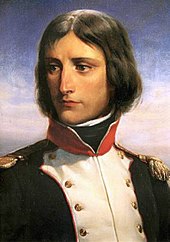
In the 20th century Napoleon’s legacy was reduced simply to his military victories and his dictatorship – however in the 19th, a time closer to his, he captured the imaginations of Western Europe’s poets, philosophers, musicians and writers as the representative of a new world age that had emerged from the French Revolution. Balzac kept a bust of him on his writing desk and claimed he was doing with the pen what Napoleon did with the sword, Beethoven dedicated his music to him, the ever controversial Lord Byron courted treason and the fury of the British tabloid press when he openly supported Napoleon whilst his countrymen died in the Napoleonic wars (and wrote no less than five poems about him), Goethe called him the embodiment of the enlightenment and Stendhal claimed that he fell when Napoleon fell. Karl Marx’s favourite philosopher, Hegel, called Napoleon the final manifestation of the sublime Spirit of History, destined to usher in the final age of man, the Age of Liberty. (Seeing Napoleon in person at a distance in 1806, was an experience Hegel likened to seeing “the soul of the world”). Coleridge admired him, as did Simon Bolivar, the future liberator of Venezuela and Colombia. Even grumpy Nietzche concedes Napoleon some greatness. Interestingly, to these men of letters of the 19th century Europe, he was not just a hero but a progressive hero.
What to make of this in 2023? To say Napoleon’s legacy, especially to the left, is complicated is an understatement. This was a man whose rise was only possible because of the Revolution, who then betrayed the Revolution by ending the Republic and becoming emperor, like his personal hero, Julius Caesar. Indeed, the spectre of Napoleon has haunted every revolution since the Revolution, with future revolutionaries always on the lookout for that military strongman destined to overthrow them and turn revolution into personal dictatorship. The brilliant Red Army general Mikhail Tukhachevsky’s fate was sealed, for example, when Stalin ominously started referring to him as Napoleonchik, little Napoleon. Tukhachevsky’s summary execution was a precursor, as every schoolchild knows, to a general purge of the Red Army officers accused of Bonapartism. Of course many of Stalin’s opponents on the Left in turn would accuse him of being the communist Napoleon.
Yet at the same time through Napoleon’s unbroken streak of victories over sixteen years of campaigning he did more to bring the ideals of the Revolution to Europe than any of the more progressive revolutionary leaders before him – an emperor who overthrew monarchs and founded republics.
In the year of our lord 2023, reactions to the film’s trailer and the man himself are simply regurgitations of half remembered factoids from history class – “couldnt defeat Russia’s winter lol”, “he wasnt that short actually”. Where there is any serious discussion of him at all, he is reduced to a despot and just another white conqueror/colonialist – which is of course part of the turth, but ignores the fact that many in his day genuinely saw as a hammer against old feudal caste system of Europe and against religious intolerance. We shall see how this conversation evolves once the movie comes out.
Napoleon is too big a subject for me to write a meaningful blog about – 500 page books have been written about individual battles he fought in a career that spawned more then 80 of them – so, in view here I shall quickly set out a list of four of my own favourite ‘factoids’ from the ‘Little Corporal’’s life, which show the four faces of Napoleon for me – radical, nationalist, liberator and tyrant.
Napoleon the Radical – after the fall of the Bastille, Napoleon began his career on the far-left of the revolutionary government
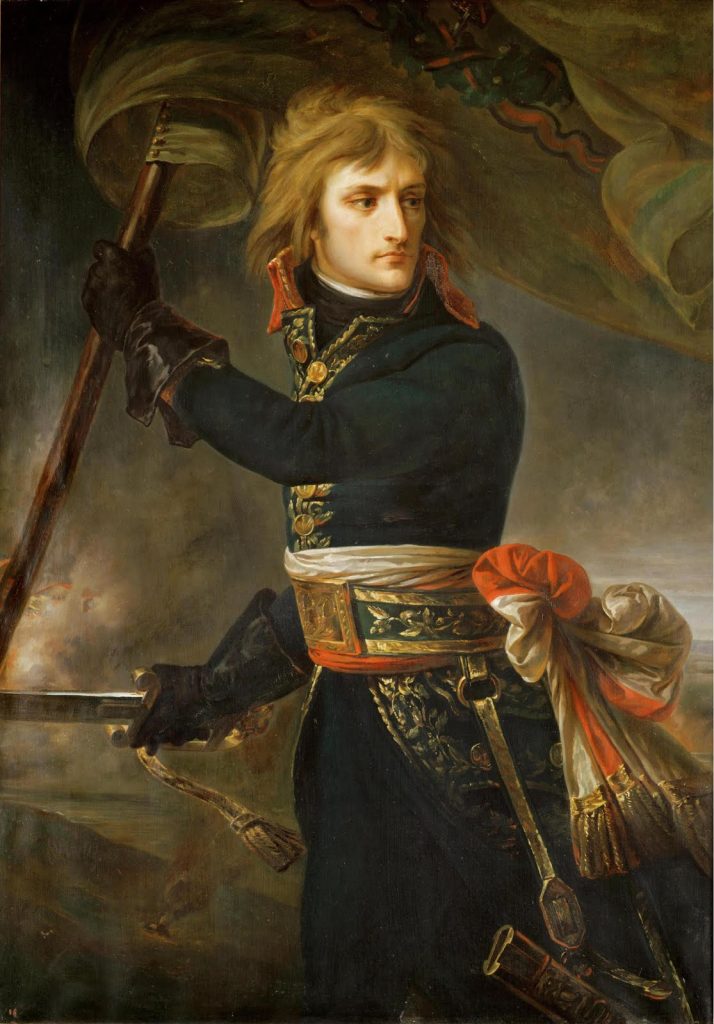
This is a surprise I find for many of Napoleon’s leftist critics. Given that Napoleon became the ‘sword’ of the Directory – the reactionary coalition that overthrew the left-wing Jacobins and Robespierre in the coup of Thermidor – and then, as emperor, spent much of his time clamping down on neo-Jacobin left wing movements, the 20th perception of him has been more of a conservative leaning centrist, or simply, an apolitical self-interested demagogue. While it is true that later on in his career he proudly declared himself as a man neither of no party but the nation, he entered politics not just as a patron of the Left, but a partisan of Maximillien Robespierre- a man who is synonymous with the most far-left period of the Revolution.Many historians say his association with the Jacobins was opportunistic rather than ideological – but he in fact joined the Jacobins much before their ascent in 1792, when they were firmly on the extreme fringes of the revolution, dominated in those early years by moderate liberals under Lafayette who wanted reform of the monarchy instead of total revolution.
I have spoken about the Jacobins in my blog on women radicals of the revolution. In brief, they were a faction which came to power in the third year of the revolution, primarily supported by the Parisian working class (the sanscullotes). The sanscullotes were by far the most militant interest group of the Revolution, the ones who tore down the Bastille and shouted the loudest for the heads of Louis XVI and Marie Antoinette and ultimately all of the French nobility. Napoleon firmly sided with the Jacobins in their vicious civil war against the more moderate French federalists, known as the Girondins, whose supporters were more middle class and favoured free market principles over the centralised redistributive policies of the Jacobins. (To make matters more complicated, both of these factions were simultaneously fighting resurgent royalists seeking to restore the monarchy). Napoleon’s first famous political pamphlet was Supper at Beaucaire, a sort of political dialogue where a Jacobin soldier upbraids a group of merchants from Marseilles, Nimes and Montpellier, the centres of the Girondin revolt, as unwitting agents of the aristocracy. This brought him to the attention of Augustin Robespierre, brother of the Jacobins infamous leader, who read it out to the National Convention. The Convention was so impressed they had it printed and circulated amongst Jacobin supporters – it was the Robespierres who pushed for young Napoleon to have his command at the battle of Toulon, where he helped in defeating a joint force of British, royalists and French federalists. The fact that Napoleon had little battlefield experience at this point in his career mattered little to the Robespierres for whom ideological purity was more important than ability – though Napoleon proved himself more than able at Toulon. Augustin accompanied Napoleon to the battle of Toulon, and eagerly wrote to his brother Maximillein about the genius of the young man, overseeing his rapid promotion to the Army of Italy.
Though Napoleon would later on in life express misgivings about controversial episodes involving the Jacobins, such as the invasion of the Tuileries and the September massacres, he remained loyal to the Robespierre brothers right until they were claimed by the guillotine. The trailer for the film in July 23 almost makes it seem like he was brought in to suppress the Jacobins – in actual history not only did have not anything to do with the coup of Thermidor, but he was actually arrested by the Directory as a supporter of Robespierre in the anti-left purge that followed it. His standing with the Directory changed when he assisted them in putting down a far-right coup, led by royalists who wanted to restore the old Bourbon monarchy. It is perhaps not surprising that he would criticise the Jacobins later on in his life as the political mood in France lurched to the right, but my own view is that his actions in those early days speak louder than his words.
One Jacobin ideal he would privately retain for his entire life even as he abandoned the politics of his youth was his aversion to religion generally and to the Catholic church in particular. He would remain his entire life a strong proponent of secular government, even when reversing bans on Catholic celebrations brought in by some of his more militantly atheist former Jacobin colleagues.
Napoleon the Nationalist – Napoleon was not just Corsican but was a Corsican nationalist in his youth
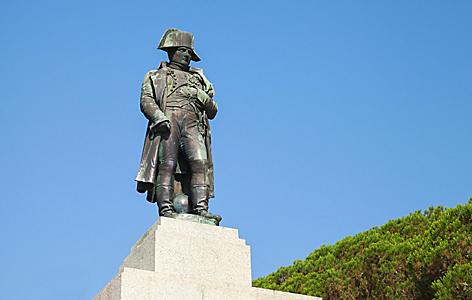
It is an often commented upon irony that Napoleon, one of history’s most recognisable Frenchmen, was not French at all but Corsican. His childhood hero was Pasquale Paoli, who had spent decades fighting for Corsican independence from the city state of Genoa, ultimately liberating it from Genoan rule, only for the French king to invade and recolonise the island in the 1760s, around the time Napoleon was born. As Napoleon himself put it “I was born when my fatherland died, 10,000 Frenchmen vomited onto its shores”
Napoleon’s father Carlo Bonaparte was a prominent resistance fighter against French rule, staging guerilla attacks from the mountains a full year after Paoli conceded defeat and fled into exile. When Carlo finally surrendered to the French governor, he was able to secure a scholarship for his then nine year old son in a military boarding school at Brienne in Southern France. Napoleon spent his formative years in France alone in this elite boarding school, mercilessly bullied for his foreignness by the children of the French aristocracy – in those pre-revolutionary days, only nobility were allowed to be officers (in fact, you had to show four generations of noble blood). They called him Cadet Paille-au-nez, a word play on his name, which means ‘straw in nose’, because of the heavy accent with which he spoke French. During this time he wrote many romantic stories and bad novels about the Corsicans rising up and expelling the French from Corsica, casting himself as a hostage son of a freedom fighter in a foreign land.
It was only many years later, when he returned to Corsica as a 23 year old representative of the new revolutionary government that he was forced to re-assess his identity. He and his brother Joseph were idealistic in their youth and keen to bring the ideals of the Revolution to their people – for which they were dubbed, likely sarcastically, the “Corsican Gracchi”, after those two famous populist brothers from the Roman republic (about whom I have written another blog). He also met his childhood hero Paoli at this time – the old warhorse had been invited back to Corsica by the revolutionary government- but Paoli remained cold to him as he considered his father Carlo a traitor for having made peace with the French. Napoleon’s revolutionary proclamations against the Church in particular alienated him from the deeply religious Corsicans, and matters came to a head when in Easter 1792 the city of Ajjacio rioted against the Jacobin volunteers. Paoli finally signed a secret pact with the British who intervened in Corsica to chase the French revolutionaries out. Snubbed, Napoleon would return to France and changed his name from the Corsican Napoleone di Bunonaparte to the more Francified name we know him by now.
Napoleon the “Liberator”
The wars of the First Coalition, in which Napoleon won his fame, began long before he was anybody in the army. The war began even before the Jacobins rose to power, when the ‘moderate’ Girondins held sway over the Assembly, in 1792. The Revolution was in its young days, the once-absolute King had been reduced to a constitutional figurehead, feudalism had been abolished together with all noble titles, all men had been declared free and equal in law and rights. The Girondins, giddy with success, declared the time had come to export the Revolution to all of Western Europe, where men still struggled under the yoke of feudal lords, and where science and reason was suppressed by the almighty power of the Catholic Church.
In the words of the Girondin minister Isnard, “We shall unleash against them a war of Peoples against Kings! Let us say to them that ten million Frenchmen, fired with the flame of liberty and armed with the sword of reason shall..make every tyrant tremble on his throne” .
Robespierre interestingly was the lone voice against war, cautioning that no foreign peoples would welcome “armed missionaries” on their soil, but he was drowned out in revolutionary fervour. France declared War on Austria in 1792, followed by Prussia, Spain and finally Great Britain. Whatever the reality of the war was, in theory the war was a liberatory war, the beginning of a hoped for Europe wide revolution.
To say the first of year of war was a catastrophe was an understatement – as it turns out, a desire to rid the world of tyrants, however genuine, was not enough when faced with professional armies. As the rabble rousing journalist Marat sarcastically commented “we had been assured that the very cannonballs themselves would retreat before the Rights of Man”.
By 1793, the position was what I have described above – a brutal civil war within the revolutionary leadership itself, and a royalist uprising spreading like wildfire amongst the more traditional and conservative provinces in the South of France, calling itself the ‘ Royal and Catholic Army’. Britain, Prussia and Austria all stood poised to invade France itself from three different fronts. It was in these circumstances that the Robespierrists took over Paris in an armed insurrection (sometimes dubbed the second French Revolution) and managed to end the civil wars by uncompromising severity to any suspected enemy of the revolution, during the period now known as the Terror. The situation at home stabilised and Napoleon’s victory at Toulon seemed to indicate a reversal in the war. Then Robespierre himself was overthrown by his enemies in Thermidor.
This new regime – the Directory – may have been as short lived as its predecessors, but out of nowhere Napoleon began suddenly began the streak of victories for which he is now best known. He had been hastily promoted to general in the darkest moments of the war, when almost a third of the French officer corps had deserted. His sole task was to guard the mountain passes in the Italian Alps from any invasion from Italy, then a collection of city states and kingdoms who had either allied with the Austrians or were under direct Austrian overlordship. He was given only a small, underpaid and mutinous regiment to do this with – this was always meant to be an obscure defensive command, while more senior generals fought the real war on the continental mainland.
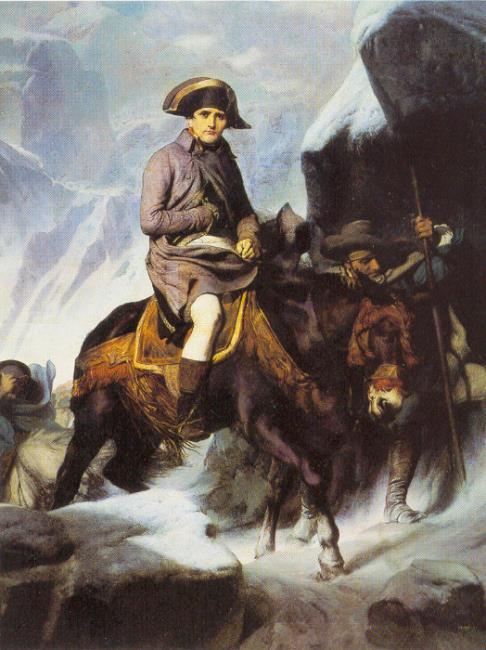
Napoleon, of his own accord, instead took what he called his “naked and underfed” men over the Alps and into Italy. With practically no money or support from Paris, he toppled all of the ancient feudal kingdoms of Italy within a year, ousted their various ruling dukes, counts and kings from their ancestral castles and established secular republics with constitutions and representative governments in his wake. In 1797 the ideological war against the Catholic church came to a head when Napoleon’s men marched into Rome. Pope Pius VI – who had spent decades preaching that all Catholics must renounce the godless Revolution – was asked to renounce all of his titles, and when he refused, was deposed and dragged into custody by the revolutionaries – who only addressed him by his birth name, Giovanni Braschi.
A new secular ‘Roman Republic’ was proclaimed, a thousand years after Caesar snuffed out the last one. Bonaparte then marched into Austria itself, France’s most formidable enemy and the heart of the Holy Roman Empire. Napoleon’s men were in artillery range of the suburbs of Vienna when the mighty Hapsburg rulers of Austria finally had to concede the unthinkable and send a delegation to plead for peace with him. The Austrians would discover, when signing the treaty at Campo Formio, that this seemingly omnipotent general who had been running rings around them for years was an “emaciated” pale faced young man of only twenty-eight years of age in a ragged simple black overcoat, whose long shaggy hair was adorned only by a plain tricorn hat and a revolutionary cockade.
The story of how he achieved this is, politics aside, remarkable, and shall be the topic of a separate blog. Though privately the Directory fretted at the young general’s increasing independence, they had to grit their teeth and sing his praises. For Napoleon’s legend had truly captured France – for the first time in the eight years since they had set out to make the tyrants of the world tremble, here was someone finally extinguishing the old aristocracies of Europe and establishing republics.
This is not to say that he was in fact greeted as a liberator wherever he went. Napoleon was able to sustain his year long campaign in Italy without financial support from Paris by ‘living off the land’ – a euphemism for plundering and paying his men in loot. Many of the Renaissance paintings and sculptures ‘liberated’ from the castles and monasteries of Italy by the revolutionaries still sit in the Louvre today and remain a topic of political controversy. However, the republics he established in Italy- the Cisalpine, the Ligurian, Partenopean and Roman Republics, were not puppet states – Italy had a tradition of revolutionary, anticlerical secret clubs and societies long before Napoleon invaded, and in their liberal membership Napoleon found a political class very willing to take advantage of the new settlement – in fact, suppression of these societies in many cases formed the pretext for intervention.
Many enemies of France’s most traditional rival, England, certainly found themselves receptive to Napoleon’s rhetoric”. Radicals in Dublin formed the Society of United Irishmen, explicitly inspired by “the brave and gallant French people” whom they called “the advance guard of the world”. As far north as Donegal and Sligo, British spies reported on meetings where “liberty, equality and fraternity” and the “complete destruction of the British Monarchy” were openly discussed. The United Irishmen pushed in 1798 for total independence for England and were supported in this by Napoleon and the Directory. Sadly, bad weather and logistical considerations impeded a landing of French troops on Irish soil to support the uprising – one of the ‘what ifs’ of history could have seen a free Irish republic 200 years before the Easter Uprising. Many Irishmen went to fight for Napoleon, and chief amongst Napoleon’s inner circle of commanders was the Irishman Edward Jennings, known as “Brave Killmaine”, a deposed son of the old Gaelic aristocracy who had embraced revolutionary egalitarianism.
Napoleon was also in correspondence with Tipu Sultan of Mysore, at the time the most formidable enemy of the British in India. I’ve written about the French revolution and India elsewhere. Suffice it to say that the South Indian sultan Tipu has been interested in an alliance with France against the British for some time. He had sent an embassy to Paris in 1788, before the Revolution, to ask Louis XVI to intervene in India against the British – this was the first formal embassy in history sent by any Indian leader to a European capital. Rebuffed by Louis the XVI, Tipu tried his luck again with the new revolutionary authorities in France.
In 1797 Tipu Sultan sent a messenger, a Frenchman called Ripaud, to the French Governor at Mauritius to relay a message to the Directory, whom he addressed as “the High and Exalted; the magnificent and distinguished in station; the kind refuge of friends; the objects of regard; the gentlemen constituting the Executive Power”.He reminded them of the long hatred the Sultan had nursed against their common enemy England and expressed the keen hope that “the garden of time would ripen.. the fruit of their mutual designs”. The response came not from the Directors but an up and coming general, who was interestingly at that time stationed not in France but in Alexandria in Egypt.
To the most magnificent Sultan, our greatest friend Tipoo Sahib,
You have already been informed of my arrival on the borders of the Red Sea, with an innumerable and invincible Army, full of the desire of delivering you from the iron yoke of England..I would ask that you send some person to Suez or Cairo, bearing your confidences, in whom I may confer. May the Almighty increase your power and destroy your enemies!
Yours C & C,
Napoleon Bonaparte
Napoleon’s grand plan was to overthrow the rule of the Mamluks in Egypt, from where he then hoped to control the sea routes over the Suez to India. From there, French support would reach Tipu and all the rebel kings of India in their fight against the British. East India Company spies worriedly reported that the French mercenaries in Tipu’s service had been allowed to form a Jacobin Club, that the Sultan himself had been seen wearing a revolutionary cockade and referring to himself as ‘Citoyen Tipoo’.
They reported the spread of ‘virulent Jacobinism’ even in allied kingdoms like Hyderabad. Even after Waterloo, decades later, old Napoleonic generals would be seen advising the armies of Indian kings such as Ranjit Singh of Punjab in their own struggles against the English.
The justification for Napoleon’s expedition to Egypt was coated in emancipatory revolutionary language, adopted to the local culture – they were there to liberate the Egyptians from the rule of the Mamluks, in theory servants of the Ottoman Caliph, in practice absolute rulers of Cairo..
“People of Egypt, they have told you that I come to destroy your religion, but do not believe it..I come to restore your rights and punish the usurpers… I respect God, his prophet and the Quran more than the Mamluks. Tell them that all men are equal before God;… Yet who owns the most beautiful land? It belongs to the Mamluks! If Egypt is their personal possession, then let the Mamluks show the lease that God gave them for it! I tell you the French are the only true friends of the Muslims. Wasnt it us who destroyed the Knights of Malta? Wasn’t it us who destroyed the Pope, who used to say that he had a duty to make war on Muslims?”
Napoleon diligently studied the Quran in preparation for the expedition, and the normally athiestic general found a surprising affinity for the religion “I prefer the religion of Muhammad to ours, it is far less ridiculous”. He even openly considered conversion whilst in Alexandria, referring to himself for a time as ‘Ali’ Bonaparte. He was inspired in this not by the call of the soul but the example of another of his personal heroes, the Macedonian conqueror Alexander the Great, who had adopted the old religion of the Pharaohs during his own conquest of the Nile and had the priesthood declare him an incarnation of Amon Ra. Napoleon was far more taken with the Prophet’s secular achievements than his spiritual ones “Muhammad was a great commander, eloquent, a great statesman, he revived his motherland and created a new power and a new people”

Before his men embarked at Alexandria, Napoleon gave his famous speech to his men, reminding them that they were there not as the crusading knights of old but as representatives of a new enlightened, secular nation:
“The people amongst whom we are going to live are Muhammadens,, The first article of their faith is this: ‘There is no God but God, and Muhammad is His prophet.’ Do not contradict them! .. Pay respect to their muftis, and their Imams. The Roman legions protected all religions. You will find here customs different from those of Europe. You must accommodate yourselves to them. The people amongst whom we are to mix differ from us in the treatment of women; but remember that in all countries the man who commits rape is a monster. Pillage enriches only a small number of men; it dishonours us; it destroys our resources; it converts into enemies the people whom it is our interest to have for friends”
Unfortunately, Napoleon’s grand designs as ‘liberator’ of the East would be undone by Britain’s greatest admiral , Horatio Nelson. Nelson found and single handedly destroyed the French fleet that had borne Napoleon to Egypt, leaving him stranded. The Mamluk Begs were indeed unpopular and crumbled before Napoleon’s forces, but Napoleon was unable to enforce his rule without any reinforcements or supplies from Europe. Napoleon’s hope that the Ottoman sultan would appreciate the French ridding him of his rebellious Mamluk servants was dashed when Selim III issued a fatwa to all the faithful against the European interlopers. Napoleon had to slink back to Europe in defeat, his Eastern dream forever abandoned. The conspiracy with Napoleon was all the pretext England needed to invade Mysore, and within a year of Napoleon’s defeat by Nelson, Tipu Sultan was defeated and bayoneted to death by East India Company soldiers.
Napoleon as Despot
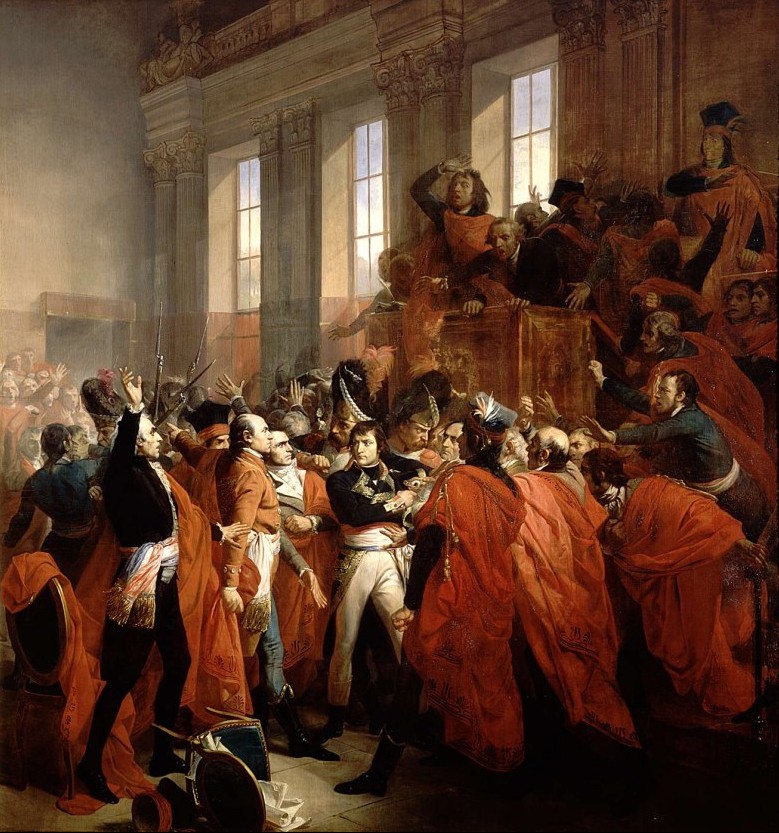
Of course, no discussion of Napoleon can be complete without discussing the greatest stain on his legacy – his brutal suppression of the great slave revolt on the former French colony of Haiti, then known as Saint Domaigne. Apparently Napoleon’s genuine if somewhat orientalist admiration for the people of the Middle East and India did not extend to the black men of the Caribbean. The tragedy of course was that, in contrast to the Egyptians, the leader of the Haitian rebels, Toussiant Louverture, was a huge admirer of the French Revolution. Touissant’s story, as well as of the men whom the great Trinidadian historian CLR James called the “Black Jacobins”, is every bit as remarkable as Napoleon’s, and a blog on this is also coming soon.
For all that conservative and liberal historians alike have branded Jacobin rule in France as the ‘Terror’, for me their greatest achievement was the abolition of slavery not just in France but her colonies, including Haiti. The Jacobins had declared slavery as incompatible with the revolution – in fact, some of the first victims of the guillotine were the great plantation owners of Saint Domaigne, including its royalist governor Blaunchland, Touissant’s old nemesis.. The new Jacobin governor of Haiti, Laveaux, would become genuine friends with Toussiant and name him the commander in chief of Jacobin France’s armies in Haiti. Toussiant, who was normally suspicious of white men, declared Laveuax his only true and intimate white friend and coined the phrase “After God, Leaveaux”. When the Jacobins fell in 1794, this all changed.
The moderate liberals of the Directory were keen to undo the ridiculous, far left policy of slave emancipation, and when Napoleon succeeded them, he agreed wholeheartedly. There were certainly economic reasons for this – Haiti before the revolt had been France’s most profitable colony – the sugar, coffee and tobacco churned out by its slave plantations made up a full third of France’s national economy. Recapturing this colony would go a huge way to financing the wars in Europe. The French Navy under the personal command of Napoleon’s brother in law bombarded the island for days. Napoleon had Toussiant dragged back to Europe in chains, where ‘the Black Spartacus’ would die in a cruel and isolated captivity in the Swiss Alps. Napoleon would come to regret this – Toussaints romantic affection for the Revolution was the only thing holding the Haitians to France, as many of them wanted all hated whites gone from their island forever. One of Toussaint’s old generals, Dessalines, took over the cause of Haitian independence and drove the Bonapartists in a few years. Not sharing Toussiant’s Jacobin ideals, Dessalines expelled all whites from the island and crowned himself Emperor of Haiti, Jacques the First.
Soon after this, Napoleon seized absolute power in France itself, in the coup of 18 Brumaire. By this point he had completely abandoned Jacobinism, writing to his brother that their dreams of a republic were just the “illusions of youth” – if France wanted to survive, it needed an absolute ruler. The senate, even after being purged of its most left-wing radical members, did not take this lying down. Napoleon and his soldiers were attacked by outraged senators when they entered the Senate on the day of the coup, screaming at him ‘tyrant’, ‘dictator’.. Napoleon even claimed, in a strange echo of his hero Caesar, that some of the senators who mobbed him had even concealed daggers on their persons and tried to stab him to death on the Senate floor. This time however, it was Caesar who won – his battle hardened veterans easily manhandled the outraged politicians away from their boss and carried them off in chains. Napoleon however was stunned by the episode- he had long been used to the unquestioning loyalty of his soldiers – and an angry outburst did nothing to allay the fears of his critics “Do not forget that I walk with the God of War, and the God of Victory! Soldiers! If any one of these politicians dare to declare your general an outlaw, let a lightning bolt strike them down”
Napoleon would crown himself first emperor of France, and would rule it for fifteen years as dictator. Most histories of Napoleon would actually begin here, for it was as emperor that Napoleon won the battles for which he is most famous, first among them the battle of Austerlitz, which redrew the map of modern Europe. But the various shifts in his ideology more or less ended here. This is a good point, therefore, for me to end and to take stock of the man himself.
The French Revolution, it is important to remember, was not just about representative government. It was equally about meritocracy. against the old feudal system in which most senior jobs in the military or the government were barred to those not from the high nobility. It was about equality before the law – in the mediaeval system that predated 1789, there were literally different legal codes and systems which applied to the aristocracy. It was about secularism, where people who were not Catholic could practise and profess their faith freely, and indeed, where a person could proclaim himself an atheist without fear of criminal prosecution, a very big deal in the 18th century. Napoleon’s policy of tolerance even led to him eventually reconciling with the Catholic church, ending once and for all the periodic Catholic uprisings by conservative peasants in Southern France. With typical pragmatism, he said “It is in making myself Catholic that I have finished the wars of Vendée; in making myself Muslim, I won the heart of Egypt. If I had to govern a nation of Jews, I should re-establish the Temple of Solomon”
Without Napoleon’s victories, these gains of the revolution would certainly also have been taken away by a restored Bourbon Monarchy. Napoleon may have placed himself and his family at the top of the system for life, but in theory all lesser offices were open to everyone regardless of blood – indeed, Napoleon’s inner circle was dominated by people of common birth. Napoleon himself, as a Corsican immigrant, represented the heights to which a person could rise in this new post revolutionary France. Freedom of religion meant that Protestants and Jews – long persecuted in Catholic France – could return, and that France became a haven for rationalists, free thinkers, agnostics and atheists. As for a legal system that applied equally to everyone – Napoleon’s greatest achievement remains the civil legal code, which still forms the basis of not just France’s legal system but the legal systems of most of Europe.
He suppressed the far-left and broke the power of the sansculottes, but Napoleon’s fiercest and most rabid critics remained conservatives and monarchists, as many on the left feared a restored Bourbon monarchy much more than they did Napoleon. Some on the left in fact argued that in a world of kings and absolute rulers determined to destroy France, having an absolute ruler as an interim measure to safeguard the achievements of the Revolution was a simple political necessity – even some Jacobins, such as Marat, had once advocated for a dictatorship. Napoleon’s secret police for their part spent much more time uncovering right wing aristocrat plots to overthrow Napoleon than left wing ones.
For Marx, Napoleon’s rise was a tragedy, a failure of the Revolution, but historians of the twentieth century have taken a more nuanced view of his legacy, even some Marxist historians like George Le Febvre. In contrast to the traditional historical view of the Napoleonic project being fundamentally an elite one, the historian Sudhir Hazeersingh writes that the transmitters of the Napoleon legend after his defeat at Waterloo were not France’s elites, but “ordinary workers and peasants, from towns and villages; former soldiers and officers; local intellectuals and pamphleteers; doctors and lawyers; schoolteachers and Freemasons”, royalists in 1815 would complain of peasants in the countryside prophesying the return of the “father”, who would bring back bread and jobs. Bonapartism would have a central role to play in the final overthrow of the Bourbon monarchy in 1848. Chateaubriand commented that the world may have slipped from Napoleon’s grasp while he had lived but, in death, he had seized it anew.
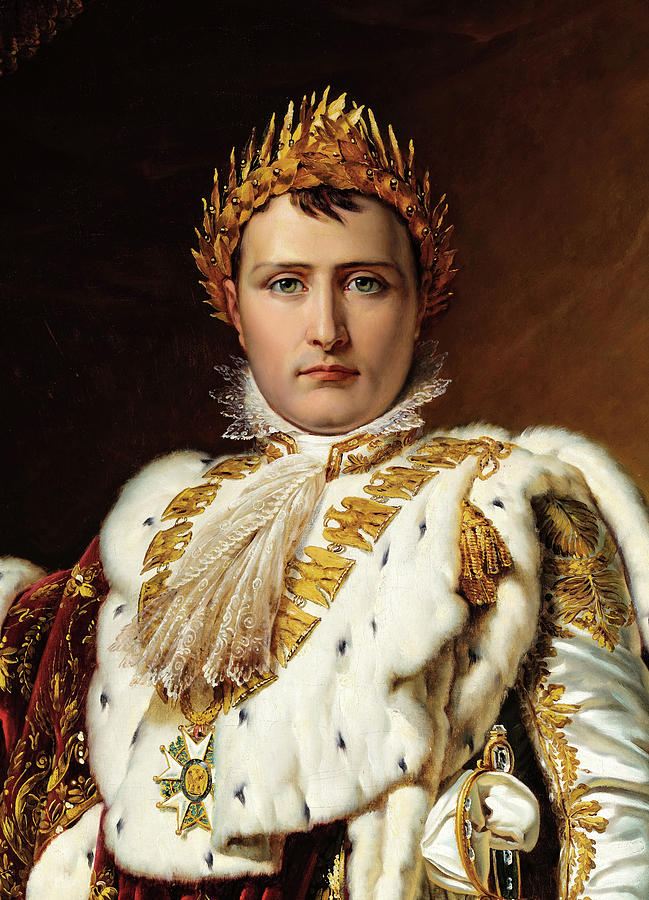
For many progressives and liberals of the 19th century, especially to those outside France who were not familiar with the internal politics of the revolution, Napoleon’s armies still were very much the armies of the Revolution. (Royalist propaganda linking Napoleon to Robespierre and Jacobinism much after the man himself had abandoned these ideals did not help!) His victories did more to spread the Revolutions ideas to Europe than all the propaganda of more progressive and democratic revolutionary governments that preceded him. Throughout Italy and Central Europe, his armies wiped out ancient feudal governments so completely that they would never quite recover. The birth of entirely new nation states in these regions, such as Italy and Germany, in what were once personal possessions of counts and dukes, became inevitable. It is hard even for his critics to argue with the fact that before Napoleon’s meteoric rise to the top in 1799, that the French Revolution was looking like a failed experiment, destined to be extinguished by the aristocracy like so many peasant revolts before it. Even to those aware of France’s internal politics, Napoleon still represented the closest they could come to the ideal form of government, in much the same way that many leftists of the twentieth century would idealise the governments of China or the Soviet Union – not perfect, but as close as was possible given the reality of the times. To quote Lefebvre, “His contemporaries always saw him as a soldier of the Revolution, and it was as such that he left his mark on history”.
